A Secret Weapon for Doing Competitor and Supplier Research

If you've been importing long enough, you've probably found a competitor (probably on Amazon) selling the exact same product as you, but at a lower price. You might be wondering if your competitor is simply sacrificing margins or if they're getting their products for cheaper, and if so, from whom.
Or perhaps you're just beginning to work with a supplier and they tell you that they supply to Walmart/Home Depot/<insert huge retailer here> and you're wondering if they're in fact being completely honest.
Guess what? Using an Import Records software tool like Jungle Scout, you can find out the answers to all of these questions.
Related reading: How to Import from China Cheaply, Safely, and Quickly (Mega Guide)
What are Public Import Records?
If you've ever imported anything, you're likely familiar with the “Bill of Lading”. This is the document that lists all of the information about your shipment, including your name, your Supplier's name, and a brief overview of the shipment's contents.
Now here's the big shocker: the United States government and many other countries make this information publicly accessible. If you've ever searched for your name or company name just for fun on Google you may have even come across a record of your import.
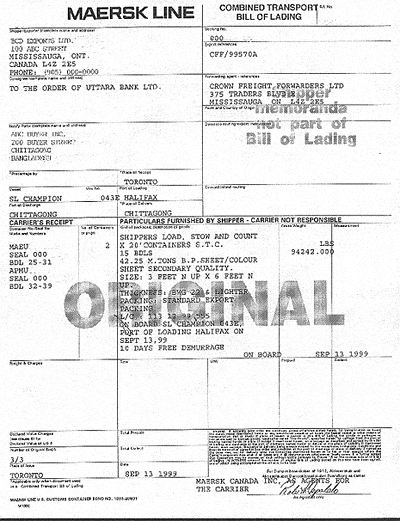
By now, you've probably put the dots together and realized that these Bills of Lading and Import Records are exactly how you can snoop and find new Suppliers.
This past year, I've been using public import records to find Suppliers. I've had extremely good success using this method to find high-quality suppliers with reasonable prices and who don't actively solicit new clients.
What You Can and Cannot Get from Import Records
The data you can receive from Import Records is limited only to shipments arriving via boat (so if you're trying to research a competitor who is shipping their iPhone cases via air, you're out of luck). However, for the United States, this consists of about 10 million records per year. In other words, there's a lot of data out there.
Here's the full list of information that most tools will give you access to:
| Country of Export | Est. Tax | Port of Lading/Unlading |
| Country of Origin | Exams | Related Party Status |
| Discrepancy Types | Export Date | Special Program Ind. |
| Entered Value | Filer | Ultimate Consignee |
| Entry Date | HTS Number/Desc. | |
| Entry Number | Liquidation Date | |
| Entry Type | Manuf. Id | |
| Est. Duty/Rate | Mode of Transport |
So what information do you NOT get access to? There's a lot, of course, but the most important thing you're not going to have revealed to you is company website URLs (both for the Supplier and the Importer) and email addresses.
Basically, you have to take the name of the Supplier and start googling, trying to find their contact info. Sometimes it's easy to find and sometimes it's next to impossible to find, which I'll address later.
How to Use Import Records to Find New Suppliers
The technique I have been using recently to find new Suppliers is to find a list of all Suppliers my competitors are using. However, I look only at my largest competitors.
In the niches my company operates in, these competitors tend to be publicly traded companies but you can pick any large-ish retailer (re: multiple brick-and-mortar stores). Try to avoid scraping the Supplier list of smaller companies.
There are a few reasons why I target only larger companies:
- Larger companies tend to have bloated costs and expenses and tend to sell their products at exaggerated prices. Smaller companies like us who have more efficient Supply chains can import directly from their Suppliers, sell at lower prices and still make a healthy margin. By the same token, this is also why I don't like to use the same Suppliers as smaller companies as they tend to have efficient Supply chains and there's no real room to reduce costs.
- Larger companies tend to only work with very professional Suppliers with excellent quality goods and who often are not advertising on Alibaba.
How to Find a Reliable Supplier from Import Records
Once you download your Supplier list, you're likely going to get a list of dozens or hundreds of Suppliers.
What we want to do is find real Suppliers, with easy-to-find contact information, who are interested in doing business with us. As mentioned before, you will get the names of Suppliers, but not their URLs/emails. So the real grunt work comes from Googling the companies' names and trying to find websites for these companies.
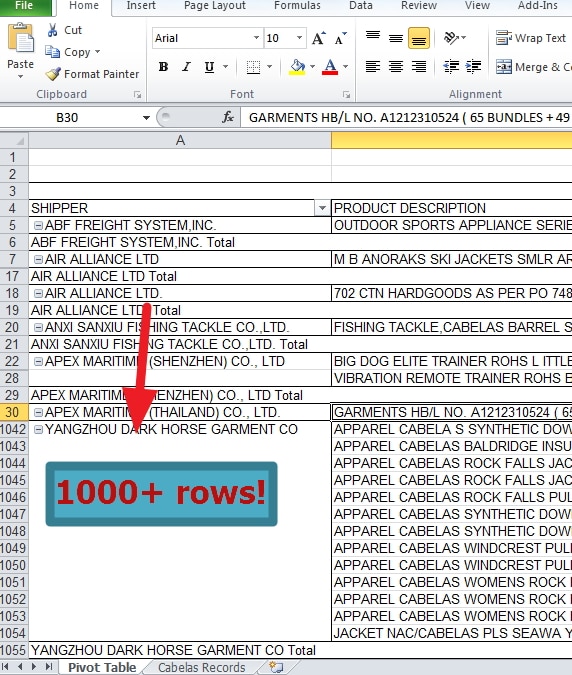
Unfortunately, finding these websites isn't always easy and even if you do find their website, they're not always open to doing business with you. You're going to find three types of Suppliers:
- Real deal Suppliers in China eager to work with you
- Real deal Suppliers in China who don't want to work with you
- Suppliers who hide their identity behind trading companies, subsidiaries, and other techniques
Addressing the last two types of companies, many companies and Suppliers try to hide their information from prying eyes like ours. They may use Hong Kong trading companies to hide their identity, holding companies, and so on.
You'll be hard-pressed to find any information about these companies. There are also some companies who you'll find great websites that show all sorts of importing treasures but unfortunately, they have no interest in doing business with smaller companies.
However, all the rest are Suppliers who would love to do business with us. And as I alluded to previously, these are typically Suppliers not advertising on Alibaba, with excellent quality products, and at excellent prices.
Related Listening: Episode 174: Avoid Getting Scammed When Importing Products From China
How to Do Competitor Research the Smart Way
Thanks to public US customs records, information about your competitor's import history and your supplier's export history is easy to find. In the United States, customs data is public information.
That means that any company that imports something into the US and any company that exports anything to the US leaves a paper trail behind them that is open to nearly anyone's eyes.
You can get access to all of this information through a Freedom of Information Request to the Department of Homeland Security and paying thousands of dollars. However, thanks to some clever SaaS products, getting this information is much easier than dealing with government bureaucracy.
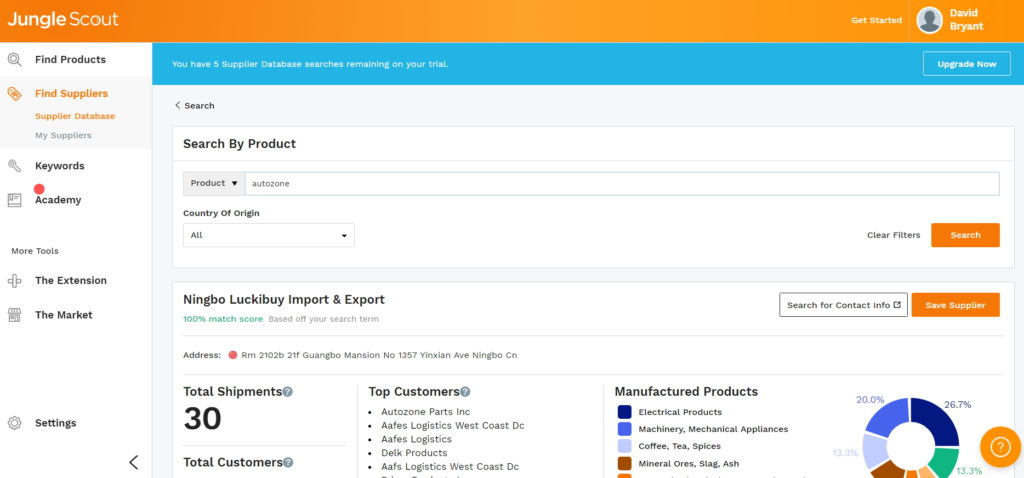
Before Spring 2019, the only way to access this information was through ImportGenius or Panjiva, which are about $200 to 300/month or PortExaminer/ImportYeti, which you can use for free.
However, these tools are outdated and have incomplete information. As of March 2019, Jungle Scout offers the exact same information as Import Genius or Panjiva but for just $39 per month.
You can simply enter the name of the supplier or competitor you want to research and you will be given information about all of the recent import and export activity for that company. Well, theoretically, that's what's supposed to happen. Why theoretically? That's because there are some serious gaps in the information:
- Most websites only give you access to US import and export information.
- Information is only as good as the information filled out in the Bill of Lading. (Describing something on a customs declaration as Auto Parts doesn't exactly tell you what type of auto part it is being imported.)
- Many Chinese companies hide their activities by exporting under the name of another company or trading company.
Import records like Bills of Lading are largely public information in the US. And even with their shortcomings, the information you can get about suppliers and competitors can prove very valuable. I like to use it in a number of ways including
- Finding a supplier for a product that I can't seem to locate on Alibaba or other channels
- Verifying a supplier's claims and legitimacy
- Seeing the average order size of a supplier to see if they're open to smaller orders
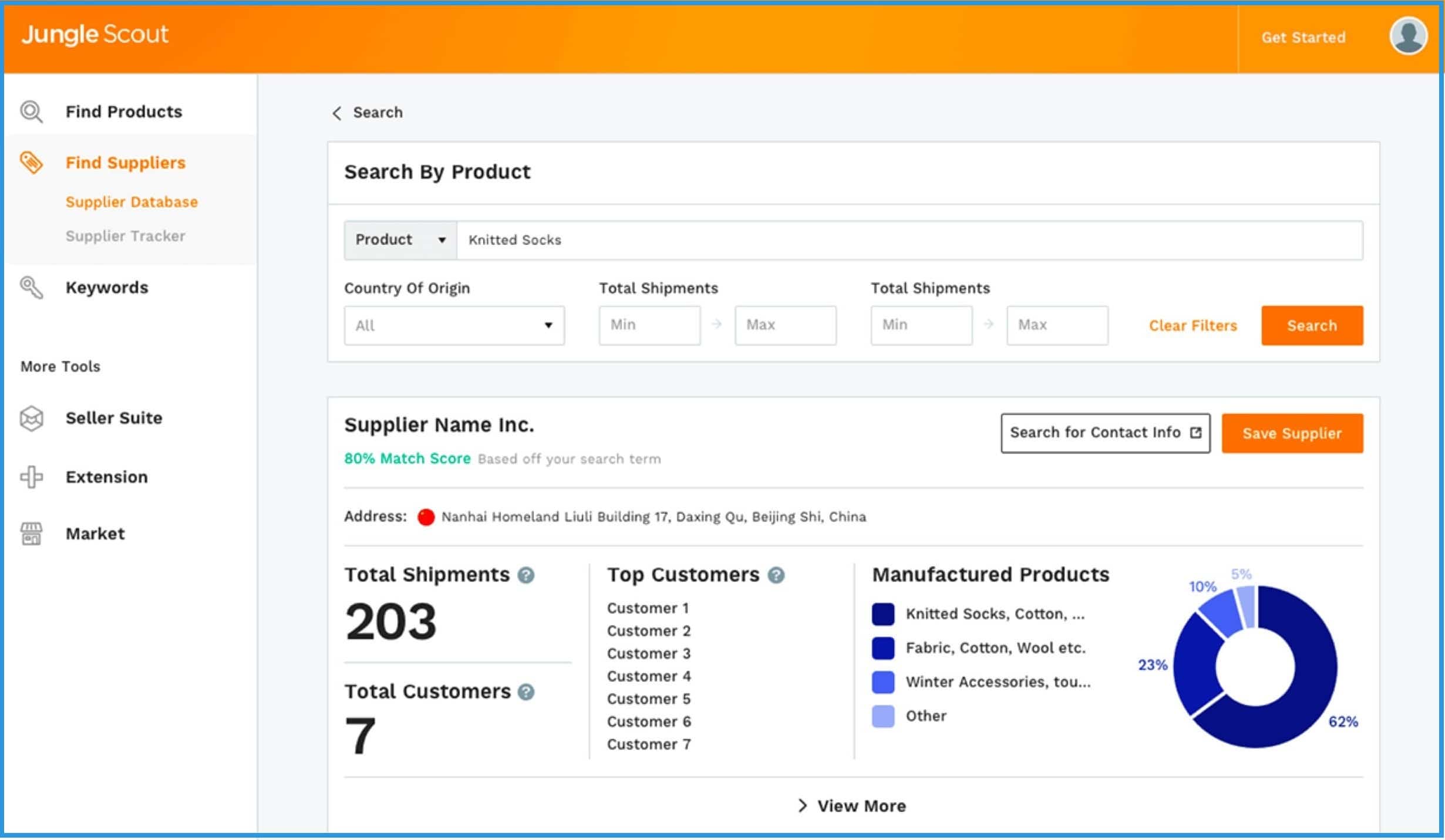
However, my favorite thing with Jungle Scout though is that with the "Supplier Database" tool allows you to find the exact supplier/factory that a seller is using for many products.
How to Use Import Records to Creep on Your Suppliers
Let's pretend you are in the automotive industry and you're looking to sell wiper blades.
You notice that a seller on Amazon is selling wiper blades for extremely cheap and you wonder a) how they get them for so cheap, and b) where they get them from. By accessing customs data information through a website such as JungleScout.com you can find out this information easily.
With Jungle Scout's Chrome plugin, all you need to do is pull up the product detail page and then within the Jungle Scout plugin, click the “Suppliers” icon like below.
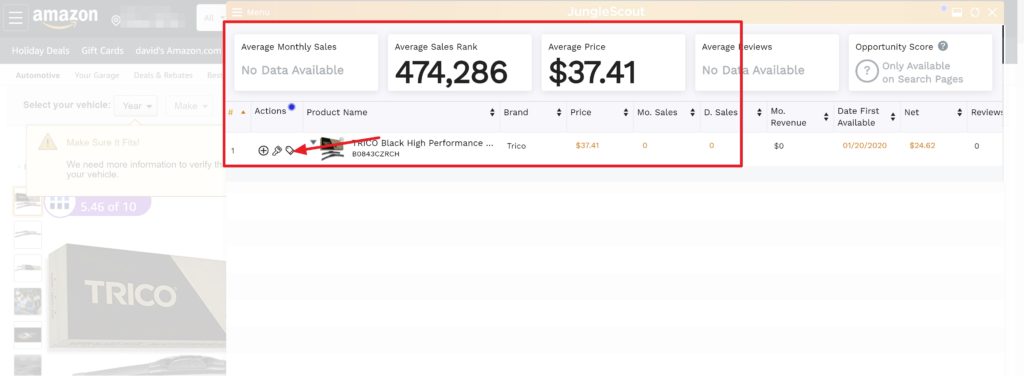
This will then bring up a page on Jungle Scout that shows the exact supplier this seller is using for these wiper blades.
It shows that this seller is using Yancheng Teda Drilling and Product for these exact wiper blades. A simple search on Alibaba or Google for this supplier name allows you to source the exact same products.
Not only does using import records allow you to find what products your competitors are using. It's also great for verifying suppliers before you purchase with them. For example, I can simply click the supplier name above and see a full record of their export history to the United States.

Now we can see that this supplier has five customers in the United States (if you scroll down further, you can see their actual names). This gives you some certainty that this supplier is legitimate and, if you wanted to take things even further, you could contact those buyers for trade references.
My Results
Over the past year or so I've found two solid suppliers via some ‘snooping' of just one major competitor.
The first Supplier manufactures a certain type of ‘case' (I'm consciously avoiding specifics here) for my competitor. Our cost is $15 and our competitor sells it for over $50.
The margins aren't necessarily amazing (especially after you factor in shipping) but they are strong. Best yet, there is absolutely no one else selling this case besides this one competitor. And this Supplier advertises almost nowhere on the internet (there's no way I could have found them without Import Genius).
The other Supplier is an absolute home run. They manufacture about 100 different plastic products in our niche. In addition, they offer dozens of other products I had never even thought of importing at equally as good prices.
When you try and pull up their company website, half the time it is broken, and when it does work it looks like something developed in 1999. If I found their website randomly, I would never ever do business with them.
But by looking at their import records, I could see that they have been working with many large companies in North America for years.
When we finally did receive a shipment from them, the quality was superb and they did a lot of ‘extras' for free, like including our logo on the physical product.
How to Hide Your Import Records: Vessel Manifest Confidentiality
Want to hide your import history from competitors? It's easy and straightforward.
You can email a written request with your business name and address to vesselmanifestconfidentiality@cbp.dhs.gov.
You can also use CBP's new automated form on this page: https://www.cbp.gov/trade/automated/electronic-vessel-manifest-confidentiality.
Requesting confidentiality is free, and YES you should do it immediately if you're importing into the United States.
Are Import Records Available for Any Other Countries Besides the United States?
Currently, the United States is the only major economy that makes import records publicly accessible. That means that, unfortunately, you can't easily find import histories for countries like Canada, the United Kingdom, Australia, and others. Sorry!
Final Thoughts
There's a serious lack of tools and apps related to importing. And while public customs data information isn't the be-all and end-all for doing competitive research, for the limited time and money it takes to perform, it's an excellent place to start. If there is one takeaway from this article, it's that you should always try and find Suppliers not advertising on Alibaba (they do exist- I promise).
It's not always possible to find such Suppliers, but when you do, you're more likely to build a long-lasting relationship with them and maintain a much less competitive product line with them.
Have you had any luck using customs information to find suppliers or verify suppliers? If so, please comment below.

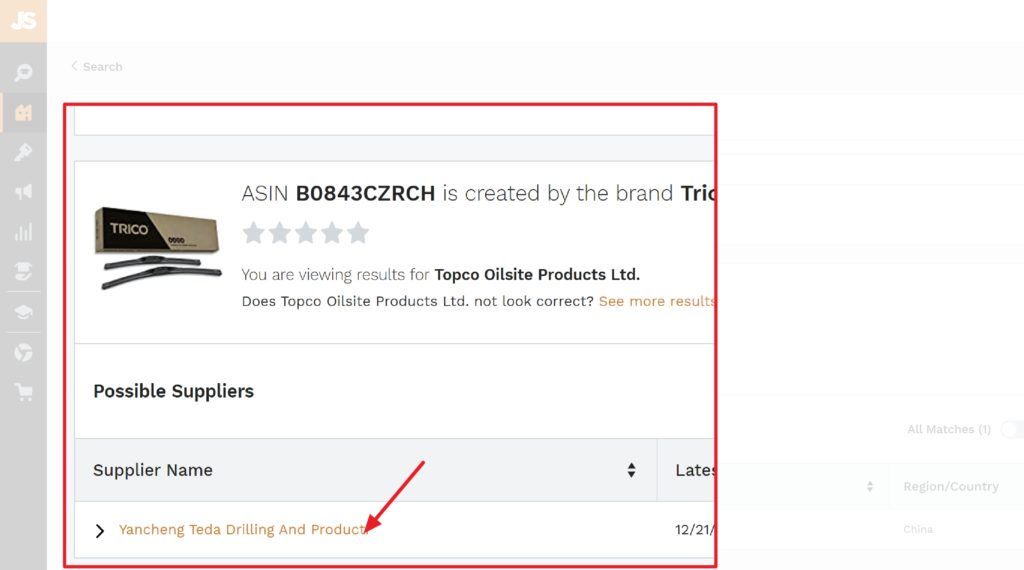




Would be so much grateful if someone points me to the website with BoL available for public use.
Hi everyone,
when I try to search for a supplier via JungleScout, an endless list of possible suppliers appears, making the tool almost useless.
Is there a way to figure out the exact supplier?
We’re talking about numbers like these:
Best Matches: 539671 suppliers
Thanks so much for your advice
Paolo
The article discusses the use of Import Records software tools like Jungle Scout to gather information about competitors and suppliers. It highlights the accessibility of import-related information, such as the Bill of Lading, which is publicly available. This tool can be valuable for businesses looking to understand their competition and suppliers better.
Hi Dave,
I don’t think all platforms have the same data. Not sure but I think some platforms combine the data from customs as well as forwarders and other sources. So, they have much more information.
Dave,
I am attempting to locate import documents for shipments brought in by a particular individual. The main piece I am looking for is the value of the property provided to customs. Is this available using this online tool? If not, is there someplace I can get this information?
Thanks,
Eric
Can you also track shipments that import via air?
Don’t think so.
Hello Dave, very interesting article indeed! Is there a website in which we can dig for free in addition to PortExaminer/ImportYeti. I heard about enigma. Let me know if you know this tool or if you know any other tool that would be worth checking. Thank you.
Most of the free tools have pretty limited data. Jungle Scout is definitely the most complete and affordable.
Can you see the duty that was imposed on an import shipment if you know:
1) CONTAINER NUMBER
2) VESSEL NAME
3) PORT OF ENTRY
4) DATE OF CUSTOMS CLEARANCE
Using import records you can see the HS code from which you can determine tariff rate.
Do you get Land and Air or Sea/Air import info through Freedom of Information Request to the Department of Homeland Security? All these sites including Jungle scout aren’t useful as it doesn’t cover air travel which most people use these days…
Hi Dave,
I love your blog. It’s super helpful for a newbie like me. I owed a coffee shop and I want to hide all my import record. Could you please suggest me any extra steps that I can do, beside requesting it to CBP thru emails?
Thank you very very much :)
Dear sir ,
I am Ajay Kumar from india , I want startup business in import and export trade data provider so please infrom me where to collect free bill of landing data
There’s nothing for India AFAIK
I don’t think you get free data any where
Hi Dave,
Similar to what John K. mentioned, I’m also seeing a lot of mis-classification of US codes when I look at importer data on Jungle Scout. Either Jungle Scout isn’t pulling the correct HS codes or people are trying to get around the Section 301 Tariffs List 3 codes. Is this common practice now? There is a product I want to source but if it’s subject to the additional 25% duty it cuts the profit margin in half. From my research, I doubt others in this market are paying the additional duty or they would hardly be profitable at the price they are selling at. And according to Jungle Scout, the HS codes they are using don’t line up with the product and they also aren’t a List 3 code. Feel free to reply via email.
I would say that without a doubt there is a significant increase of misclassification of goods now :)
Is there a way to find the supplier when they hide it under a different trade name? Does the Jungle Scout extension or any others offer that service/ability?
Not really.
I thought you said you can pay us customs for it? If you pay us customs will the same information be given or the actual manufacture.
The cost is thousands of dollars directly from them.
Buen día Dave
Como puedo pedir a panjiva que elimine todos mis registros o literal el registro de mi empresa importadora, ya que ahí se muestra todo lo que compro en USA y mis proveedores, lo cual es bastante perjudicial. Gracias, saludos
Dave – Interesting article. Thanks.
We are trying to identify the HS Codes that competing importers use for their imported products. We believe there is a high level of mis-classification in our industry. We subscribe to Panjiva and there is some HS data listed for shipments but I am told that this data is a “guess” by Panjiva and is, thus, not very accurate. Do you have any comments or advise?
Hmmm, I thought the HS code was disclosed (at least the first 6 digits. Could be wrong though.
hi is it possible to track your competetor,s supply from united state if it was by road thank you
No.
Very helpful info! Thank you Dave.
You’re welcome.
Very useful article. Ive just applied for the data to be hidden via government request and I’ll be setting up another company to show on the BOL as well. My question is, is there anyway to remove the information that Panjiva and others have on their site or is it there forever? On a personal directory you can “opt out” so your information is not displayed but I’m wondering if it’s possible to get in touch with these companies and have them remove this import data somehow as it’s pretty detrimental.
Don’t think there’s a way to retroactively remove it.
Indian trade data of Import& Export plays a very essential role in defeating and chasing the competitors in the same business because in this competitive world, a person who has knowledge of current market trends always wins. It is the success key for the growth of Indian economy. It shows the current up & down trend of Indian trade market.
Thanks!
Do you know of any way to gain this information from Canadian bill of ladings etc?
Not available unfortunately.
I saw a new result popping up called ImportKey. It seems similar to Panjiva and ImportGenius. Have you looked at this one before?
I’m not familiar with it but there’s a few similar tools ot there.
Hi Dave
Piers, Panjiva and others only has exporters but I can’t find a database of Chinese Import or Europe Importers.
please, Can you help me?
I’m not sure that information is public in those regions.
Hi Dave,
I found this article really interesting. Do you know if there is anything similar if my competitor is in the UK? I know 100% they purchase their product from china but I cannot for the life of me find it.
I could be wrong but I don’t believe it’s public information in the UK.
Hi Dave, I am another competitive intelligence researcher, is there a database website that can give information of shipments/manifest between two foreign countries like Greece and Netherland? Thanks
Don’t think so :(
Thanks for responding Dave.
Do you know in which country importers`s bill of ladings are public information?
Not off the top of my head unfortunately.
Jungle Scout only works a small % of the time. So I’m trying to find a better way. This is great info you’re sharing. Thank you dave
Yes, all of them unfortunately only have the data SOME of the time. They’re all using the same data pool though.
Very helpful Dave. Thank You.
You’re welcome :)
Hi Dave, great info, thanks. I’m doing a bit of research on how to source this data for myself. There seem to be two access points, and I can’t figure out how to get to either:
1. The companies selling data from shipping companies, such as manifestdb.com
2. The companies selling customs data, like Import Genius, Panjiva, PIERS, etc.
Besides US customs data, do you have any idea how these guys are sourcing their data, and how I’d get ahold of it myself? Thanks in advance.
Hi Brendan – my understanding was that it only comes from U.S. customs directly. I do not think the shipping customers are selling manifest data.
Great info! Very helpful, im currently sourcing for good suppliers which I am having a bit of difficulty with, many of the sample products I have been made though ALibaba are below quality and is costing me quite a lot of money.
It’s a wide spectrum of quality with China in general. Many great suppliers and many not so great.
I just learning about ECommerce, I love this blog, it’s another piece in a great puzzle, thank you.
Thank you!
Hi, Import genius provides information about who imports them from china to Venezuela and who are their suppliers? Thank you.
Hi, I don’t think Venezuela is included at this time.
Hi Dave,
How recent is the data? Since Port Examiner is free, do they get older data or more incomplete?
With all the tariff talks, this type of info will be more important.
Yes, Port Examiner’s data tends to be far less complete/older.
I’ve tried this method with a few services and always hit a dead end. I’m trying to find the source of one of my suppliers but their name is never found in these databases. Any suggestions ?
They likely either have their records blocked, are buying domestically, or have another company they import under.
As far as I can tell, Port Examiner doesn’t have any data after 2016.
You may be right.
Hi, Do you recommend Panjiva? How it compares to ImportGenius? Thanks.
Hi,
They’re both pulling from the same data source so they’re pretty comparable IMO.
How can i find any exporters total trade history in india.?
This is only for imports to the U.S.
Do any of the services show what is the cargo value for individual shipment records? For example, the value of 1 container widgets imported from China. I’ve used Import Genius before and wasn’t able to find this this information.
I really can’t remember but if import genius isn’t revealing it then it’s probably not available.
What is the reason that “Many Chinese companies hide their activities by exporting under the name of another company/trading company”?
Mainly to protect their buyers but often these companies have such a web of subsidiaries and trading companies they operate under that it happens inadvertently.